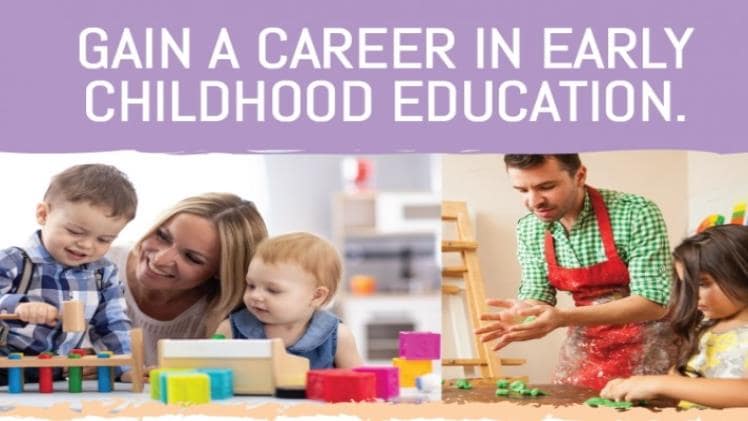Have you been daydreaming about a fulfilling profession where you could develop practical skills and have a lot of work opportunities? Do you want to interact with children to mould their education and create enduring bonds with their families? Then focus just on a position in a Diploma of Early Childhood Education and Care or Certificate 3 in Early Childhood Education.
Jobs in the Early Childhood Education Sector
In Australia, more than 1.3 million children join one of the 7,300 licensed childcare facilities. There are a minimum of two early childhood instructors for every kid at every centre. Children to instructor ratios in child care facilities are clearly outlined in the National Quality Framework:
- Birth to 24 months: 4 children to 1 teacher
- 24 to 36 months, 5 students to 1 teacher
- 1 teacher for every 10 or 11 students, from 36 months to preschool (depending on State)
- One teacher to 11, 13, or 15 students beyond the preschool age (relying on State)
Given these numbers, it is clear that more skilled early childhood educators are required both now and in the future.
Imagine a Career in Child Care
Assume working with kids in a safe setting to encourage their play and help them acquire the skills and information they need to flourish via a variety of practices and activities. Imagine the impact you may have on young children’s lives by helping to establish early childhood programmes and fostering their ideas.
Looking after children in an early childhood facility and becoming an early childhood educator are both tremendously fulfilling careers. In a daycare cots no two days are the same. You can be making programmes and planning activities for the kids. To accommodate the needs and aspirations of the children in your care, you’ll plan educational activities and breathe life into the early childhood programs.
Australia’s Need For Child Care Employees Will Rise Following COVID-19
In particular, qualified early childhood educators are required to reach the demand for spaces in child care centres when parents return to the workforce after the epidemic.
Although there is now a scarcity of competent teachers, the Australian Government has made great efforts to safeguard the country’s programs for children by offering a Childhood Education and Relief Package. This means that parents and the early care and education sector will get extra financing from the Commonwealth government to support the growth and development of our young children in a secure setting.
You must Enrol in and pass an early childhood education course in order to work in child care. The minimal requirement to work in the majority of early childhood education centres across Australia is to have a Certificate III in Early Childhood. Since over 50% of teachers in child care facilities are required to have a diploma or higher, professionals with a Diploma of Early Childhood Education and Care are also in high demand. You may even start your own daycare centre in your house batooto.com.
What Job Positions in Early Childhood Education are Available?
After receiving your Certificate III in Early Childhood Education and Care degree, you may normally qualify for these child care positions after you are a competent early childhood educator:
- Child Care Educator
- Child Care Assistant
- Family Day Care Educator
- Early Childhood Education Assistant
- Mobile Child Care Assistant
- In-home Child Care Provider (nanny)
- Director in a Child Care Centre
- Lead Early Learning Educator
These occupations vary in terms of full-time, part-time, and temporary employment, and they have a very good potential for future advancement, based on the child care centre.
The Best Aspect for Finding Employment in Early Education and Care
Continuing to work in early childhood care services has several facets, one of which is having the ability to influence young children and putting teaching techniques into practice. The field of early childhood education and care offers several job opportunities. One of the most ethnically and culturally varied industries is child care, with staff and families from a wide range of nations and cultures. This offers engaging and fascinating lessons for our children as well as opportunities to recognised and value their individuality.
Numerous early care centres also observe cultural activities, holidays, and occasions, such as NAIDOC Week, Chinese New Year, and Diwali, to mention a few.
The Following Stage is to Enter the Early Childhood Education Sector
Do you wish to foster the knowledge and abilities of children? Do you have a strong commitment to the early years of schooling and a desire to cultivate respectful connections with parents? Do you wish to foster creativity and like watching kids learn via play? Do you value children’s education and care? Then this dynamic sector is right for you!
“The early childhood sector requires people who are compassionate and caring as well as entertaining! Since children learn via play, their learning is enhanced when you participate and engage with them. Working with children post completing your basic degree like a Diploma of Early Childhood Education and Care requires passion, enthusiasm, and love of the subject.
Enrol Right Away For a Certificate or Diploma!
If you bhojpurihub register in a child care course in an Australian University such as a Certificate III in Early Childhood Education and Care or a Diploma of Early Childcare education course, you will understand how to improve a structure for learning that has been approved, how to educate young children appropriately, how to provide nutritious food options, and how to respond appropriately in the event of an emergency. You will acquire all the abilities and information needed to excel as an early childhood educator nobkin.
The greatest resources and instruction riley reid and rudy gobert marriage will be offered to students in this course in order to help them grow and acquire the information required to get careers as early childhood educators. Your job opportunities will improve and be enhanced by earning a nationally recognised credential.

